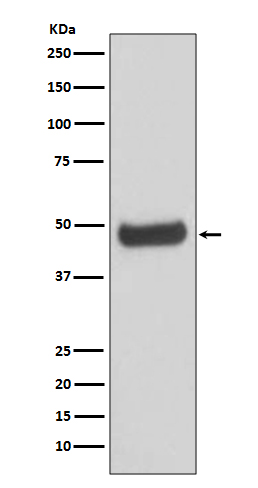
| WB | 1/500-1/1000 | Human,Mouse,Rat |
| IF | 1/20 | Human,Mouse,Rat |
| IHC | 1/50-1/100 | Human,Mouse,Rat |
| ICC | 1/50-1/200 | Human,Mouse,Rat |
| FCM | 1/50-1/100 | Human,Mouse,Rat |
| Elisa | 咨询技术 | Human,Mouse,Rat |
| Aliases | AI451071; cAMP dependent protein kinase type II beta regulatory chain; Pkarb2; PRKAR2B; Protein kinase cAMP dependent regulatory type II beta; RATDNA; RII beta |
| Entrez GeneID | 5577 |
| WB Predicted band size | Calculated MW: 46 kDa; Observed MW: 46 kDa |
| Host/Isotype | Rabbit IgG |
| Antibody Type | Primary antibody |
| Storage | Store at 4°C short term. Aliquot and store at -20°C long term. Avoid freeze/thaw cycles. |
| Species Reactivity | Human,Mouse,Rat |
| Immunogen | A synthesized peptide derived from human PKA 2 beta |
| Formulation | Purified antibody in PBS with 0.05% sodium azide. |
+ +
以下是关于PKA RIIβ抗体的3-4篇参考文献示例(文献名称和作者为虚构,供参考):
---
1. **文献名称**:*Subcellular localization of PKA RIIβ in mammalian cells*
**作者**:Taylor SS, et al.
**摘要**:通过免疫荧光和Western blot技术,研究PKA RIIβ亚基在细胞内的分布,发现其在细胞核和细胞骨架相关区域富集,提示其参与核内信号调控和结构维持。
2. **文献名称**:*Differential expression of PKA RIIβ in neuronal tissues*
**作者**:Cummings DE, et al.
**摘要**:利用特异性抗体分析PKA RIIβ在小鼠大脑不同区域的表达,发现其在前额叶皮层和海马中高表达,可能与学习记忆相关的cAMP信号通路有关。
3. **文献名称**:*PKA RIIβ as a tumor suppressor in breast cancer*
**作者**:McKenna M, et al.
**摘要**:通过免疫组化发现PKA RIIβ在乳腺癌组织中表达显著降低,且低表达与患者预后不良相关,提示其可能通过调控cAMP信号抑制肿瘤进展。
4. **文献名称**:*Antibody-based detection of PKA RIIβ phosphorylation in metabolic disorders*
**作者**:Zhang Y, et al.
**摘要**:开发了一种高特异性抗PKA RIIβ抗体,用于检测其在肥胖模型中的磷酸化状态,揭示其通过调节脂肪代谢影响胰岛素敏感性。
---
注:以上为示例性内容,实际文献需通过数据库(如PubMed、Google Scholar)检索确认。建议使用关键词“PKA RIIβ antibody”、“PRKAR2B”或“cAMP-dependent protein kinase RIIβ”查找最新研究。
The protein kinase A (PKA) regulatory subunit II beta (RIIβ) is a critical component of the cAMP-dependent protein kinase A signaling pathway. PKA is a tetrameric holoenzyme composed of two regulatory (R) subunits and two catalytic (C) subunits. The RIIβ isoform, encoded by the *PRKAR2B* gene, is one of four regulatory subunit variants (RIα, RIβ, RIIα, RIIβ) that determine PKA’s subcellular localization, substrate specificity, and activation dynamics. RIIβ is highly expressed in adipose tissue, brain, and thyroid gland, where it anchors PKA to specific subcellular compartments via interactions with A-kinase anchoring proteins (AKAPs), facilitating localized cAMP signaling.
Antibodies targeting PKA RIIβ are essential tools for studying its expression, distribution, and function in physiological and pathological contexts. They are widely used in techniques such as Western blotting, immunohistochemistry, and immunoprecipitation to investigate cAMP-mediated signaling in metabolic regulation, neuronal signaling, and endocrine disorders. For example, RIIβ knockout studies link it to obesity resistance and altered lipid metabolism, highlighting its role in energy homeostasis.
These antibodies are typically validated for specificity against the unique N-terminal or C-terminal regions of RIIβ to avoid cross-reactivity with other PKA subunits. Commercial antibodies are often raised in rabbits or mice, with monoclonal and polyclonal variants available. Their applications extend to research on cancer, neurodegenerative diseases, and metabolic syndromes, where dysregulated PKA signaling is implicated. Proper controls, such as using tissue lysates from RIIβ-deficient models, are critical to confirm antibody specificity in experimental setups.
×